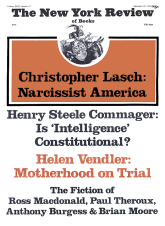In response to:
Battleground from the August 5, 1976 issue
To the Editors
I have sent the following letter to C.L. Barber, who reviewed my book, English in America, in your May 27 issue.
Dear Joe:
I wish you had liked English in America more, but you didn’t. I won’t try to change your mind at this date by rehearsing my argument or disputing your account of it. Instead, I’d like to question, briefly, some points in your own position.
You mention the “radical potential of literature itself.” I doubt you mean that all (good) literature has that potential, and I can certainly agree that much literature does. How does it happen, then, that our literary classics have so often and so easily been assimilated into the cultural lingua franca of a ruling class or professional elite, and have contributed so little, especially in America these past hundred years, to working-class consciousness or socialist movements? I imagine you accept my view that most reading of, and talking about, these works goes on in and around school and college. There’s much evidence now (e.g., Jencks, Inequality, Bowles and Gintis, Schooling in Capitalist America) that school and college help maintain inequality and the attitudes that support it from one generation to the next. What are the signs that, within this setting, literary study is a subversive force—as you put it, “a source of energy for politics” that makes for “fellowship in living”?
You would answer, I take it, that many teachers of literature do side with Matthiessen, Raymond Williams, Fredric Jameson, etc. Sure, and there are some socialist doctors, lawyers, and millionaires too. Would anyone conclude from that that law, medicine, and money are potential sources of radical change in America? No doubt, in the fervor of writing a critical book I paid less attention than I should have to progressive colleagues and to what you call “the positive things in our profession.” I acknowledge them, and persist in thinking them largely neutralized or co-opted by the institutional structure that contains them. How can this change, so long as we keep our professional bargain with capitalist society, think of our work as nonpolitical, and wait for the radical potential of literature to be somehow released?
Finally, I’d like to correct any impression left by English in America that I think the case for socialist revolution hangs on capitalist abuse of the humanities or on the state of our profession. I do think Marxism explains these things, along with more fundamental exploitation and injustice.
Richard Ohmann
Wesleyan University
C.L Barber replies:
Dear Dick:
Having already had the chance to respond in the NYR [August 5] to Frederic Jameson’s criticism, I should not take much more space to argue my own position. Despite the deeply discouraging fact that our schooling works on the whole to maintain inequality, and uses literature in the process, I look for more than you do from the participation in literature of people within the ruling class and professional elite. Whatever we can expect from working-class consciousness, however much or little we can change it or use it, most of our students are from the “middle class” or are upwardly mobile into it. Our main concern has to be with them, and our main resource has to be literature.
At moments of political crisis, members of the ruling class and professional elite have always provided an important part of leadership, whether for revolutionary goals (Chou En-lai and Mao) or for resistance to reaction. It may be only an English teacher’s solipsism, but I have the impression that literary culture mattered to many among such leaders and their supporters. Certainly many of those now resisting Soviet domestic repression draw sustenance from participation in literary tradition as it validates the intrinsic freedom of literary action (for example, Andrei Sinyavsky as described by Helen Muchnic in the NYR for August 5).
As you say in your covering letter to me, we must find a time to talk. I am particularly eager to hear more about where you think social change can come from. I am not at all clear about that. Certainly you are right that it will not come straight out of literature, uninterpreted. In using F.O. Matthiessen as an exemplar, I partly by-passed the problem of what we, now, need to bring to interpretation. He drew radical conclusions from literary study. But his understanding of literature was shaped by what he brought to it—his own need for fellowship in living, his Whig sense of obligation to the less fortunate, his Christianity, the mood after World War I and World Depression I. One cannot say: “Go thou and be likewise.”
Joe
This Issue
September 30, 1976



